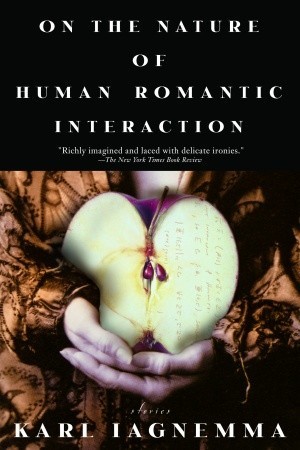Iagnemma is a deserving winner of multiple prizes. I came to his collection blind, however--and was in for quite a treat. His writing, especially in the first half of the collection, is of a nature that I was fully entranced, hanging on the beauty of the sentences even as the plots themselves unfolded. How does a writer write so well? Iagnemma does more than just tell a good story; he rolls it out like a fine piece of art that feels as if it has weight and importance without being so heavy as to seem ponderous.
The opening/title story is about math--or about how logic interacts with our understanding of relationships, which I believe is essentially nill. The lead character is a former student in love with the daughter of his former advisor, who is in turn in love with an undergrad. The daughter does not want the weight of a relationship; the narrator wants to have the daughter for himself. Why this need to possess things? Why not just enjoy?
"The Phrenologist's Dream" focuses on a nineteenth-century scientist who has great doubts about his career. He travels the country studying women's skulls in order to ascertain the levels at which women can love, and yet he knows that his science is likely quackery, as he can find no real patterns. Enter Sarah, a bald woman on trip to reunite with her husband and who is also something of a scoundrel.
Both these opening stories involve women unwilling to commit to a relationship, which led me to believe that perhaps this theme might run throughout the collection, but the next story, "Zilkowski's Theorem," does not involve such a character and begins to take the collection in new directions.
“The Confessional Approach” takes a break from the math-heavy backround that forges part of the first three stories. This one involves a couple who make mannequins deciding how ethical it is to sell those mannequins to someone who wishes merely to use them for target practice.
"The Indian Agent" simulates the journal of a man sent to Michigan to broker good will and piece between white settlers and a small band of "peaceful" Indians. Alas, distrust between the two and white greed creates a situation the agent begins to lose control of and patience with. Here, a romantic relationship is not the center of the story but rather its lack--the isolation that comes with being alone in a foreign land.
"Kingdom, Order, Species" returns to the science and math world, as a mediocre academic stalks the author of her favorite field guide. Here, we have a romance story of sorts, complete with a happy ending of sorts and, thus, different in tone than most of the other stories.
"The Ore Miner's Wife" deals with a woman whose miner husband takes an interest in science. This interest leads her to believe that perhaps he is cheating on her.
A similar theme creeps into the last story, "Children of Hunger," which recounts the experiments of William Beaumont on an injured man, experiments that allow him to see in to a man's digestive track. So obsessed does he become--so in love with science--that he sacrifices the love of his wife.
And that, I suppose, is what the collection is about, that intersection between science and love, logic and feeling, as if somehow we might be able to quantify love in some mathematical sense.
Thursday, July 14, 2016
On "On the Nature of Human Romantic Interaction" by Karl Iagnemma ****
Labels:
Books,
Collections,
Four-Star Collections,
Karl Iagnemma
Subscribe to:
Post Comments (Atom)







No comments:
Post a Comment